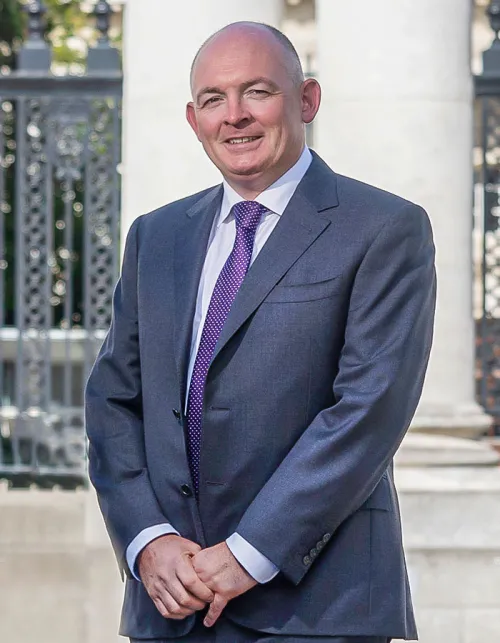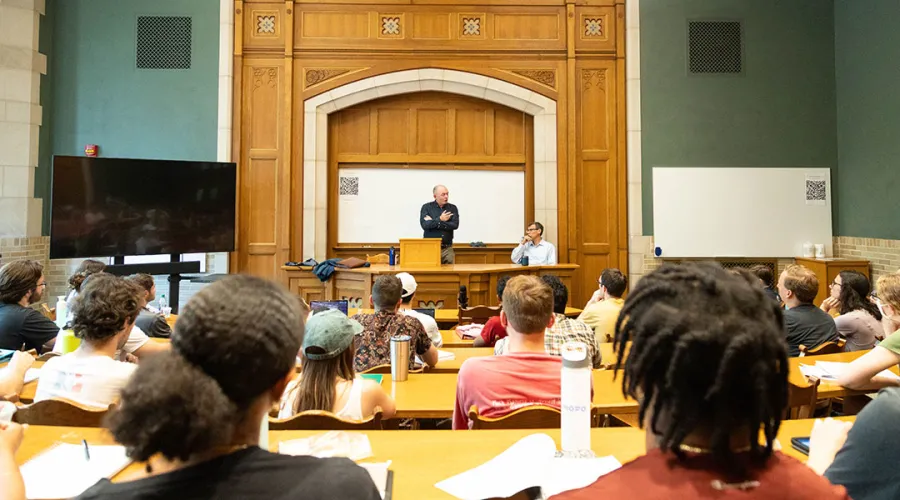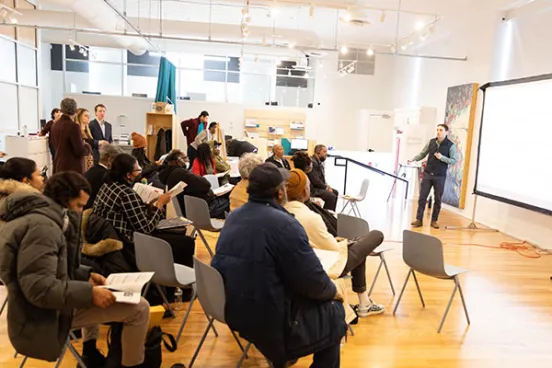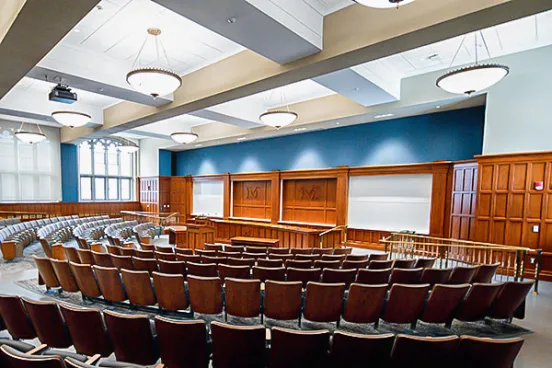
When Rossa Fanning, LLM ’00, became attorney general of Ireland in late 2022, he didn’t need to endure the confirmation process of his counterpart in the United States, which can take weeks or months following the nomination.
Rather, in two head-spinning days, he transitioned from his successful legal practice to his seat in the cabinet of the prime minister of Ireland, Leo Varadkar. Nominated on December 17, Fanning assumed his new position on December 19. He spent the day in between accepting messages from well wishers—and divesting himself of his practice of 22 years.
“I had to contact people effectively overnight to withdraw from all the matters in which I was retained and advise them that they would need to retain somebody else. So it was a little bit of a shock to the system,” he says in something of an understatement.
Fanning was well positioned to assume the role of attorney general when the government came calling. Over the previous two decades, he had become one of Ireland’s most highly regarded barristers, with clients including tech giants Facebook, Google, and Twitter, as well as champion golfer Rory McIlroy and other high-profile figures. He even represented a concert promoter when it sought to enforce a judgment against the musician Prince.
Rossa Fanning, LLM ’00It is part of our legal and political system that citizens are entitled to challenge government decisions in the courts by way of judicial review.”
Representing government interests
The role of attorney general in Ireland is a fusion of solicitor general and White House counsel in the United States, as Fanning serves as both legal adviser to the government and chief law officer of the state.
“In simple terms, I am the government's lawyer,” Fanning says. (The country’s minister for justice heads the Department of Justice.)
One of his main responsibilities is representing the government in all litigation before Irish courts and foreign tribunals. As a member of the European Union and a signatory at the European Convention on Human Rights, Ireland is often a party to foreign legal proceedings before the Court of Justice of the European Union or the European Court of Human Rights.
A second major responsibility relates to his role in advising the government on the constitutionality or legality of legislation.
“That could be legislation about cattle or pigs that the Department of Agriculture is progressing. It could be legislation about minimum prison sentences that the Justice Department is progressing. Across government's entire legislative program, there has to be a view that the legislation is lawful and constitutional. And that view comes from my office,” says Fanning. “So if the government is considering embarking on any particular course of action, there is a requirement that it considers whether or not there are any legal implications.”
All of this makes for a varied portfolio as he oversees a staff of more than 480 across three Dublin offices.
“A lot of government policy at the moment is aimed toward improving the supply of housing,” Fanning says. “Therefore, lots of complex litigation that we're dealing with, which involves attempts to challenge planning permission for housing development and also a major legislation project with a new planning bill, has to do with infrastructure and development projects and planning law.”
Another priority has been the availability of emergency accommodation for international protection applicants related to the war in Ukraine.
“Many thousands of Ukrainian citizens have arrived in Ireland,” Fanning says. “And they have all been permitted to come here to seek international protection. But the combination of the entirely understandable influx of Ukrainian nationals fleeing the war in the Ukraine, coupled with a significant increase in international protection applicants from other jurisdictions, has at times put the government under pressure. Although in recent times we have again been able to accommodate all applicants.”
During his first year as attorney general, he has learned that there's never a day when he is not dealing with litigation against the state. The country’s history of judicial review dates back to 1937, when the current constitution came into force.
“It is part of our legal and political system that citizens are entitled to challenge government decisions in the courts by way of judicial review,” he says.

The long road to attorney general
Among Fanning’s first steps to the office of attorney general was his arrival in 1999 at Michigan Law, which he describes as a “voyage into the unknown.” After studying law as an undergraduate and graduate student at University College Dublin (UCD), he secured a Fulbright Scholarship and a recommendation from the dean of UCD Law School that Michigan would be a good place to study.
“I arrived on campus not knowing a single person in Ann Arbor. And, actually, I found that to be exhilarating as an adventure,” says Fanning. “I learned a lot about myself.”
He also learned a lot about US law, steeping himself in questions about the Constitution and learning from professors and students who challenged him academically.
“Almost all the difficult questions about the federal government and American constitutional law ended with the answer Marbury v. Madison,” says Fanning. “One class was taught by Terry Sandalow and populated by academically stronger students who were ambitious to apply for federal clerkships.”
He also recalls classes with Evan Caminker, dean emeritus and the Branch Rickey Collegiate Professor of Law, and Ellen Katz, the Ralph W. Aigler Professor of Law. In fact, Katz’s work came up in a recent conversation between Fanning, in his role as attorney general, and Koen Lenaerts, president of the Court of Justice of the European Union.
“Lenaerts was talking about Professor Katz's work on voting law,” says Fanning. “He was referring to her as an academic in the States who had particular expertise in that area. And I knew immediately who he was talking about.”
To this day, Fanning keeps in touch with several of his LLM classmates, who message through a WhatsApp group. And during recent travels to South America, he was able to visit alumni friends in Chile and Argentina.
“My recollections of Michigan are very positive,” he says, “both at a personal level and at an academic level.”
After receiving his LLM in 2000, Fanning had job offers that would have allowed him to remain in the US, but he chose to return to Ireland and start his legal practice.
His caseload ranged from commercial disputes and defamation to media law, representing newspapers and tech companies. He also did some work for the government, defending the Irish state in public law, administrative law, and judicial review-type proceedings. In 2016, he “took silk” and became a senior counsel (Ireland’s equivalent of a king’s counsel in the United Kingdom).
One of his most visible cases was representing MCD Productions, the largest concert promoter in Ireland, which sued Prince when he canceled a concert, without cause, after millions of euros had been spent for promotion and booking the venue.
“It's not often that you're in litigation against Prince,” says Fanning. “He did deliver a witness statement in the case but ultimately declined to come and testify. And the case was settled by the lawyers on his behalf.”
He says the transition from private practice to being the chief legal adviser to the government has been a “fairly radical” change of pace and responsibilities.
“Government is complicated,” says Fanning. “And it does take some time to understand the rhythm of government and the mechanics by which government decisions are made. So I've learned a lot.”









